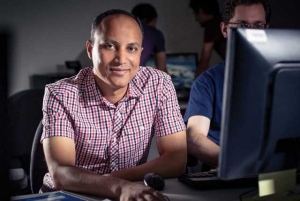It is no surprise the first major cyber war was launched from Russia, home to much cyber criminality. Mannan suggests that, like tax havens, botnet location is merely a case of lowest legal resistance. “The attackers are dynamic. If they have, in the Russian or now the Chinese legal system, better opportunities to hide, they will exploit that system.”
With our information under constant threat from hackers, we need armour. The assistant professor holds a Natural Sciences and Engineering Research Council Discovery Grant to improve the security and privacy of high-impact applications, such as email and online banking, “to benefit society and average citizens.”
A major means to thwart threats is improved passwords. Because truly secure passwords are too hard to remember — imagine memorizing X@h6y3i89B9*4n03!k — many users employ simpler ones that include real words and reuse them on multiple accounts. “I can’t really blame people,” says Mannan. “We are pattern-based animals.” Mannan has devised a few password-generation techniques to circumvent these problems.
With his master’s degree student, Adam Skillen, Mannan recently released Myphrase, software that generates a “passphrase”: six words long. To ensure the words themselves are familiar to the user, a 1,024-word dictionary is devised from the user’s own writing, such as sent emails. But, as a compromise between security and memorability, “I do not let you choose which words, or their order, because I know what you will do — make a coherent phrase that is more easily hacked,” says Mannan. The generated passphrase can be a random sequence of words, like “purple monkey dishwasher move seem wish,” or, by using a part-of-speech engine and sentence templates, the connected discourse option gives the passphrase the slightly more memorable ring of semantic sense: “They traced again and loudly radiant.”
For the less linguistically inclined, Mannan’s object-based password (ObPwd) requires a user to select any file from his or her computer or an online location. The software will generate a strong password from the binary code underlying that file. Rather than memorizing a password, all the user has to do is remember where he has stored the file.
Both ObPwd and Myphrase have proven robust to attacks. The greatest risk to the average user, says Mannan, is actually the user her- or himself. Since companies like Google and Facebook don’t want to exclude potential customers, they suggest but don’t enforce using strong passwords. Worse, through social media, people unwittingly reveal password and security-question information — your date and place of birth, siblings’ names, high school and so on.
I think those who post everything on Facebook now will learn and advise their children differently.
“If I have access to your Facebook account, I can customize the attack,” says Mannan. “You think, ‘Who will guess that my password is my wife’s name when there are so many possibilities?’ ” But hackers’ powerful computer algorithms render random guessing attacks quickly, and targeted attacks quicker.
“Even by not using Facebook, your privacy may be leaked,” says Mannan. Tagging friends in a photo confirms their identity, like a photo ID. We are effectively spying on each other.
Our failure to account for both computers’ computational power and the transparency of online communication is what Mannan calls our “mental model problem” with digital technology. “If I send you an email, I think I’m just sending you an email, as if it’s a letter. But all these emails are just sitting in a server, so they’re absolutely not private.”
One possible solution would be to pass more stringent privacy laws. However, Mannan points out, “Government is an interested party. If we disallow Facebook to collect all this information, then the government also has no access to it [through a court order], so there is a conflict.”
And the conflict exists at all levels. While President Obama hosted Chinese President Xi Jinping in June for a friendly yet face-saving summit to discuss the problem of Chinese cyber-espionage stealing U.S. state and corporate secrets, Stuxnet, the U.S.-Israeli cyber worm allegedly deployed in 2010 with Obama’s blessing to cripple Iran’s nuclear centrifuges, was hailed as a lowcost, 21st-century warfare solution. At all levels, “Everyone is targeting and exploiting everyone else,” says Mannan.
The combination of its traceless transparency and the government’s interest make surveillance a given, with most people believing that they’re lawabiding citizens and have nothing to hide. Yet Mannan asks, “Why do you lock your door when you’re home? Would you accept a web cam in your home so that the whole world can see?” He believes attitudes towards discretion will eventually change. “Most people just don’t understand the privacy implications of online services. I think those who post everything on Facebook now will learn and advise their children differently.”


 Mohammad Mannan in Concordia’s computer security laboratory. The assistant professor conducts research on authentication and passwords.
Mohammad Mannan in Concordia’s computer security laboratory. The assistant professor conducts research on authentication and passwords.